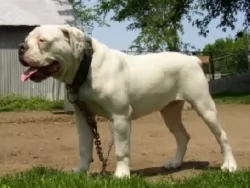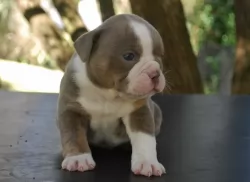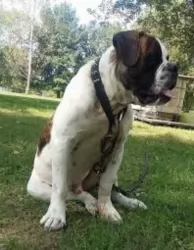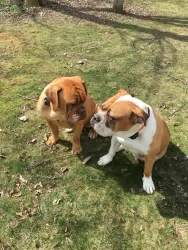 MyDogBreeds
MyDogBreedsHermes Bulldogge is originated from United States but Dogo Cubano is originated from Cuba. Hermes Bulldogge may grow 8 cm / 4 inches higher than Dogo Cubano. Hermes Bulldogge may weigh 22 kg / 49 pounds more than Dogo Cubano. Hermes Bulldogge may live 5 years more than Dogo Cubano. Both Hermes Bulldogge and Dogo Cubano has same litter size. Both Hermes Bulldogge and Dogo Cubano requires Low maintenance.
 The Hermes Bulldogge is not a breed in itself, but is actually a line within the English Bulldogge line. The Hermes family in the United States bred this line for several years. The Hermes Bulldogge line is the largest of the re-creations from the English Bulldogge. They are inspired by the arena dogs from the days of the Roman Empire. Greg and Linda Hermes have bred healthy, smart, resilient and agile dogs. The desire of the Hermes was an attempt at recreating the 17th century dog.
The Hermes Bulldogge is not a breed in itself, but is actually a line within the English Bulldogge line. The Hermes family in the United States bred this line for several years. The Hermes Bulldogge line is the largest of the re-creations from the English Bulldogge. They are inspired by the arena dogs from the days of the Roman Empire. Greg and Linda Hermes have bred healthy, smart, resilient and agile dogs. The desire of the Hermes was an attempt at recreating the 17th century dog.
They used a variety of breeds to create the Hermes Bulldogge, most of whom are never disclosed. Some of the dogs that were probably used include: English Mastiffs, American Bulldogs, Old English Bulldogges, and pit Bull Terriers. This family of dogs are playful, friendly, and good family dogs. They have a strong prey drive which makes them good hunters but not as good around other small animals or small children. The Hermes have been breeding the Hermes Bulldogge since since 1983. The puppies are all hand raised, child friendly with great health.
When discussing the Hermes Bulldogge, one must go back to the root of the English Bulldogge. That breed comes originally from England and various lines have been recreated by various breeders. The breeding of the Old English Bulldogge with Mastiffs and Pits lead to other lines that the breeders called Old English. But most fanciers believe that only two lines of the original Old English Bulldogge remain and that is the Leavitt and the Hermes.
Some form of bulldog has been in existence since 700 years ago and as it was mixed with a variety of other breeds it took on other forms over time. The English Bulldogge was a definite couch potato. Instead of being bred for a job or look, the Bulldogge was developed with temperament, ability and health in mind. This has made for a great family dog without a lot of veterinarian bills.
The Cuban Mastiff which came from Cuba, was developed from breeds of Mastiffs, Bulldogs and cattle dogs, with the breed being thought to be extinct since the end of the 19th century.
The Dogo Cubano had a number of roles to fulfill in its day and they were used for guarding stock, for dog fighting and for chasing runaway slaves. After the abolishment of slavery, the large dog had no real role and it died out.
Known also as the Cuban Mastiff or Mastin de Cuba, there isn’t much accuracy as to its origins, with the most common story for their origin being that they are descendants of the Molossus.
The dogs were later introduced into Western Europe, becoming fairly common in England and Spain. The dog was also was also mentioned in the works of canine authors Stonehenge and George Wood.
 The Hermes Bulldogge, much like the original Olde English Bulldogge, is taller, healthier, more athletic than the original English Bulldog. They are medium height, with a large head, a strong body and a deep, wide chest and broad shoulders. Tails might or might not be docked but the ears are never docked. They n have a moderate amount of wrinkles and a longer, less smashed face than the original. It is easier for the Hermes Bulldogge to breath, to fly and to live in warmer environments that it is for the English Bulldogge. His eyes are lower in his head but in the front center.
The Hermes Bulldogge, much like the original Olde English Bulldogge, is taller, healthier, more athletic than the original English Bulldog. They are medium height, with a large head, a strong body and a deep, wide chest and broad shoulders. Tails might or might not be docked but the ears are never docked. They n have a moderate amount of wrinkles and a longer, less smashed face than the original. It is easier for the Hermes Bulldogge to breath, to fly and to live in warmer environments that it is for the English Bulldogge. His eyes are lower in his head but in the front center.
They are very dark almost black. Eyelids should cover the white of the eye and they have rounded cheeks. They have a short muzzle and short face. Broad, thick lips finish out the face with very large, square, broad jaws.
The Dogo Cubano was generally similar to other Mastiffs and stood at rough 48 – 55cm in height and weighing in the region of 45kg.
He was a large dog, powerfully built, muscular and strong. Images of the dog show that it had strong, straight legs with a long tapering tail and medium-sized floppy ears that were sometimes cropped upwards and close to the head.
The dog breed came in a variety of colors such as brown, tan, fawn and brindle. The muzzle was broad and short and black. The dog had pronounced jowls with its face being fairly wrinkly.
This large dog was known for being a courageous, independent and aggressive dog. He became attached to his owner, showing protective characteristics .In those days the dog would have received simple training and certainly if such a large dog still existed today, it would have to receive training and socialization as well.
The Dogo Cubano was an intelligent dog and easily trainable, requiring an owner with a firm hand. Being an aggressive breed, the dog possibly wouldn’t have been the best companion for children. He also wouldn’t have got on too well with pets in the home as he was trained to be a fighter in his day. Independent and strong-willed, the dog would not have suited a novice dog owner.
 If socialized properly this line of bulldog is harmful to me.
If socialized properly this line of bulldog is harmful to me.
Strong and athletic, his strength and stamina.
He is not very adaptable. Apartments are not good for this dog. He needs to run and if possible to hunt.
He is very intelligent but stubborn which affects his learning ability.
The Dogo Cubano was bred to be a guard dog as well as for dog fighting, but this large dog, with training and socialization, no doubt became a loyal and devoted family pet.
It was actually a social dog, being aggressive towards other dogs. He would be described as a dog better suited to a home with older children.
He was protective with his human family but not very active, being too big to be leaping around like other dog breeds. It is a pity that this large dog has disappeared as he had some good qualities.
 The Hermes Bulldogge is healthier than most bulldogs. His face is not as smashed and he is not as wrinkled. He can breathe easier than other Bulldogs. The two major concerns are hip dysplasia and bloat.
The Hermes Bulldogge is healthier than most bulldogs. His face is not as smashed and he is not as wrinkled. He can breathe easier than other Bulldogs. The two major concerns are hip dysplasia and bloat.
Hip Dysplasia also some elbow dysplasia: can cause lameness and arthritis
Terminal unless treated immediately. Can be prevented by not feeding large meals before or after heavy exercise.
The Dogo Cubano was a generally healthy breed, but just like with most other dog breeds, they were also prone to some of the more common dog problems. The chances of him getting sick were slim though.
When the dog first originated, there were unlikely to have been health clearance certificates, but today, you’d want health clearances from the Orthopedic Foundation for Animals.
The reason for this is that hip dysplasia is a heritable condition, seen more often in large dogs, where the thigh bone doesn’t fit into the hip joint properly. The dog suffers with pain and discomfort and the condition can lead to lameness with the dog.
Gastric Torsion or Bloat is a life threatening condition that affects large dogs like the Dogo Cubano and those with deep chests. The stomach is distended with gas and it can twist.
The gas can’t escape and blood flow is hindered. The dog vomits, is lethargic and weak, and immediate veterinary help will be required.
 When feeding a Hermes Bulldogge puppy be sure you feed puppy meal for bulldogs or medium dogs. For first year fee 2-4 times a day 2 cups food.
When feeding a Hermes Bulldogge puppy be sure you feed puppy meal for bulldogs or medium dogs. For first year fee 2-4 times a day 2 cups food.
Feed the adult a solid adult dry food. 2 cups twice a day.
Better health than most lines of Bulldogs. Few wrinkles and less problems breathing as he doesn’t have a smashed face.
He doesn’t need a lot of exercise but daily walks and lots of play time. He can enjoy Lure Coursing obedience, agility and obedience
The Dogo Cubano was a large dog, so if he did become used to living in the city, he would have adapted better to life in the country.
He wasn’t a dog requiring too much exercise but he would have needed to go for walks. They were used as guard dogs long ago, and if he had been in existence today, you wouldn’t have been able to include him in your jogging and cycling as he was a dog that could easily overheat.
Not all dogs require the same amount of food. Long ago the Dogo Cubano wouldn’t have had the same variety of dog foods available today. Maybe the dog in those days was fed the same kind of food that his owner ate.
Today, if these dogs were still around, they would require the best quality ‘large dog breed’ kibble.
The better the dog food, the more nourishing it is and the healthier the dog is. The Dog Cubano would likely have been a dog that drooled, leaving quite a bit of backwash in the water bowl, so it would have been important to wash out the drinking bowl and to regularly replace it with cool, fresh water.